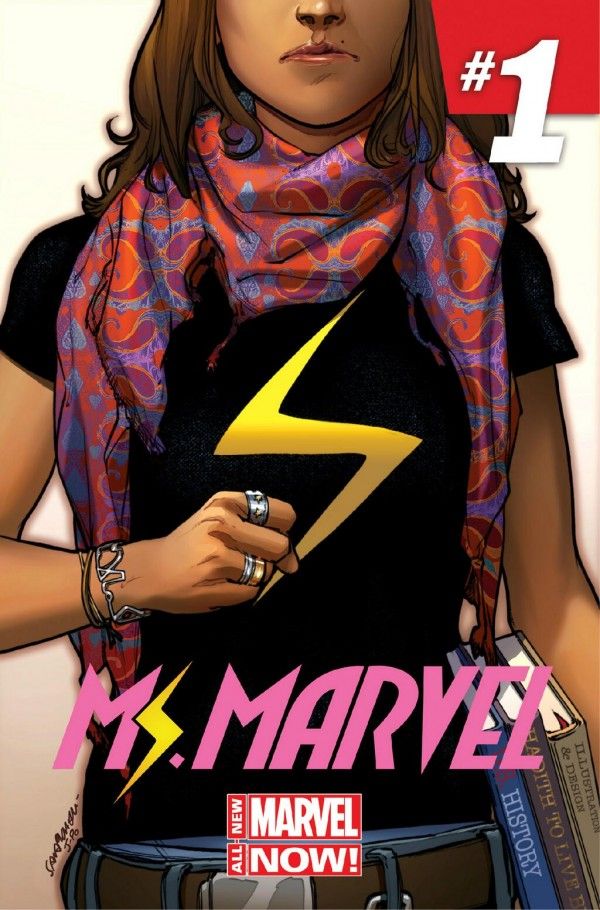Marvel's announcement last week that a Muslim teenager living in New Jersey will star in the new Ms. Marvel series is an exciting step forward in diversifying superhero comics. And even better is the involvement of writer G. Willow Wilson and editor Sana Amanat, both Muslims, which should bring an authentic voice to the title.
The move is already garnering a lot of media attention, and I expect it will pique the curiosity of a number of people who never really expected a mainstream comic book to tell a story so closely connected to their own. This isn't the first comic book to do something like this, but it's remarkably significant.
I'm looking forward to Ms. Marvel, and I really hope the comic finds an audience (I'm also thrilled to see artist Adrian Alphona back on an ongoing series). But there's no doubting this title is an underdog. Marvel often struggles with keeping solo series starring women; just ask fans of She-Hulk, or Rogue, or Carol Danvers. Poor Storm can't even get more than a miniseries every 10 years or so. DC may be able to boast Wonder Woman and a number of female-starring Batman spinoffs, but both publishers have had limited success sustaining books that star minority characters. From Black Panther to War Machine to Steel to the current Batwing, there have been valiant efforts that ultimately get canceled. And I'm hard-pressed to think of a significant Marvel or DC book starring a character whose religion was such a strong crux of the premise.
Readers and retailers are notoriously uneasy about trying a book that could be considered at-risk. That's why Marvel and DC fall back on their major brands: They know they can market Wolverine because enough of their customers faithfully follow the character, even while complaining he's in every other book. Instead of buying what sounds interesting, too many readers would still rather support what they can be assured will be around for the long run.
There's also the issue of the Captain/Ms. Marvel brand: Despite the acclaim of Kelly Sue DeConnick's Carol Danvers run, Captain Marvel has never proved itself to be a character that can support a franchise. The fact that the character's superhero name has changed from Ms. Marvel to Warbird to Captain Marvel to whatever else demonstrates the branding challenges. The original Captain Marvel, Mar-Vel, was never a stellar seller, either, despite the acclaim of "The Death of Captain Marvel" story. Despite a few teases, there's a reason he's never been brought back to life, after all. An attempt in the '90s to introduce a new male Captain Marvel didn't work out either. It's not that it can't work, but most retailers know at least some of that history and order accordingly because they don't have a lot of faith in the name bringing in readers.
That's a lot of bad news for the upcoming Ms. Marvel. If it's so doomed, why did Marvel even bother? Whether or not the book succeeds, it's clear Marvel sees something changing in its readership. There were lots of reasons why Miles Morales as Spider-Man should never have worked -- and yet, there he is still web-slinging two years later. Yes, sales have weakened. Whether the character stays around following the current "Cataclysm" event running through the Ultimate Universe remains to be seen, but the character has been demonstrated to be more than just a stunt. It's also possible that the book's sales were pulled down, at least in part, due to the imprint's luster diminishing over the last five years or so; it's not just Ultimate Comics: Spider-Man's sales that have weakened, but the entire line's.
If a Facebook snapshot of comics fans by Graphic Policy carries over to the real world, women may make up 45.45 percent of comics readers. How many of those interact with comics by going to comic book stores is unclear, but Marvel might see a female readership within reach where previously it seemed more theoretical.
There is a part of us that loves rooting for the underdog, and I hope Ms. Marvel is a wild success. The talent behind the series is certainly capable of creating a good read. But despite their best efforts, the book faces a tough climb. And yet, that's just the kind of challenge that defines a hero.


